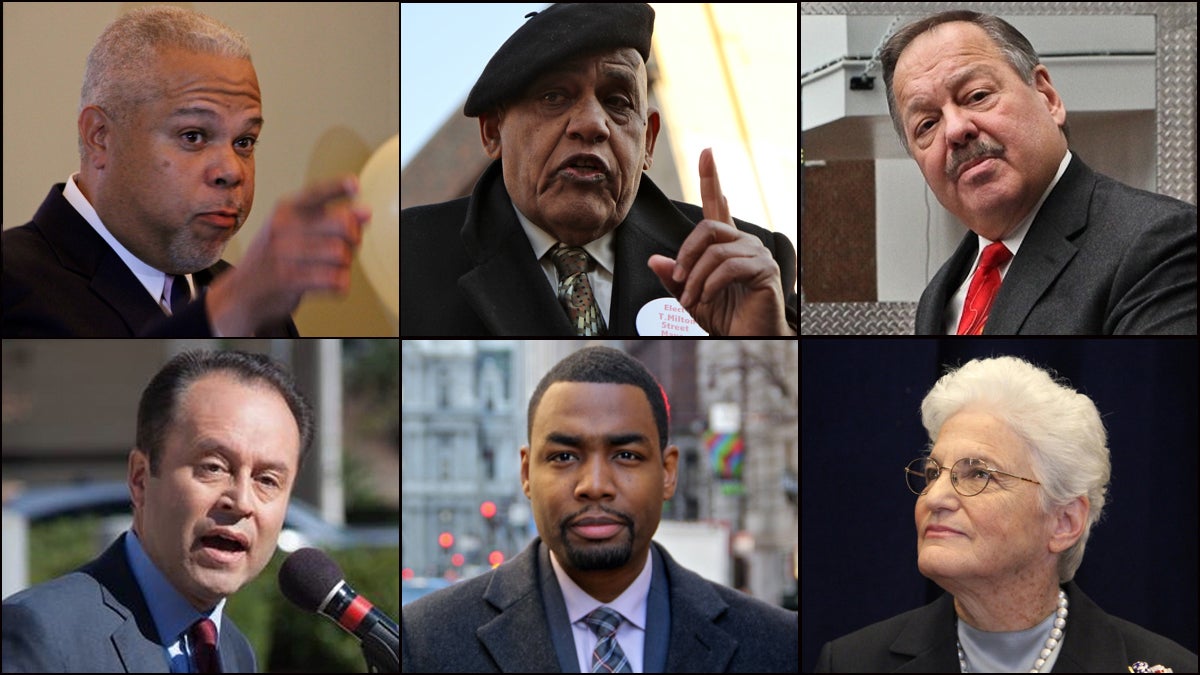Philly mayoral candidates mull charter school expansion
Listen
Candidates for mayor of Philadelphia (clockwise from top left) Anthony Hardy Williams, T. Milton Street, Nelson Diaz, Lynne Abraham, Doug Oliver, and Ken Trujillo. (NewsWorks file photos)
Should there be more charter schools in Philadelphia?
That’s the question currently being weighed by the School Reform Commission as it reviews 40 applications from operators hoping to open new schools.
With the race to become Philadelphia’s next mayor heating up, the candidates were asked to contemplate the issue.
Although the SRC will make its decision far before the next mayor would have any influence, taking a position on charter expansion is one way candidates can differentiate themselves in a race where all will call for the state government to increase funding and implement a student-weighted funding formula.
The question is not as straightforward as it may seem.
With each new charter the SRC approves, the cash-strapped school district, which has no taxing authority, will incur additional costs. Assuming the charters would open next year, these costs would add to next year’s projected budget deficit – eventually being resolved through additional funding or additional cuts to the district’s existing schools.
But the SRC is aware that with each rejection letter it sends, applicants can appeal to a state board that has the power to override its decision.
Anthony Hardy Williams
State Sen. Anthony Hardy Williams, considered the front-runner at this point, has long championed the charter sector.
In his failed 2010 bid to become the Democratic gubernatorial candidate, he attracted record campaign sums from a pro-charter and voucher PAC endowed by the founders of the Conshohocken-based investment firm Susquehanna International Group.
Hardy Williams Academy, a charter school Williams founded and named after his father (who preceded him in the state Senate), became part of the Mastery network in 2011.
Of this year’s slate of charter-hopefuls, Williams took a measured tone, saying the SRC should “work in concert” with schools Superintendent William Hite and consider new applicants “in the context of what revenue we currently have.”
“Regardless of what new idea we have, we have to pay for it,” he said, adding the state must return the budget line — axed by Gov. Tom Corbett — that helped districts defray the added costs of the charter sector.
“Charter school reimbursement has to come back so we can stop with the tension – charters versus traditional publics – and get to the business about a quality public school experience, which includes charters and magnets and neighborhood schools.”
Given the district’s dire fiscal constraints, Williams was asked if he could foresee a scenario in which the SRC would deny all charter applicants.
Williams said the SRC could at least authorize as many charter seats as those lost in the midyear closings of Walter Palmer and Wakisha charter schools. Together the schools had signed agreements for 1,075 students.
“That at a minimum we can do,” he said.
In its deliberations, Williams also said the SRC should count on Gov.-elect Tom Wolf bringing about “a historic consequence” in terms of how Pennsylvania funds public education.
“There are a whole host of things that [the SRC is] going to have to project this year in this budget not knowing necessarily where the finances are, including charters,” he said. “My hope and belief is that they will be making making decisions about charters certainly from a fiscally responsibly perspective, but also from an academic performance perspective, from a quality seat perspective, from a safety in schools perspective. All those things should be in the mix.”
Citing M. Night Shyamalan’s book “How I Got Schooled,” Williams said that if school officials, teachers and politicians spent more energy focusing on the city’s lowest-performing schools, “it would drive the needle of traditional public districts across the nation, certainly Philadelphia.”
Williams would not name a favored applicant in this year’s pool. Mastery has submitted two applications.
“I don’t want to get into the picking and choosing business. I have an opinion, as most politicians do,” he said. “But I really do believe we should entrust the hard details to educators and the folks who run those systems.”
Lynne Abraham
Former Philadelphia District Attorney Lynne Abraham said “there’s a proper balance that should be struck between charter and public schools.”
Abraham, chair of the board of directors of I-Lead, which runs a charter school in Reading, Pennsylvania, said the SRC should ensure that it doesn’t approve schools that will enroll students beyond their signed agreements.
Over the years, some parents have been misled in thinking that charters would be a better option for their children, she said.
The SRC’s actions during this process, she said, should allow parents to “rest comfortably knowing that charter schools are giving the best possible educational chance for their children.”
Asked to further clarify her position about the SRC’s current decision, Abraham said:
“Parents want charter schools, but here’s the way I would tend to look at it. I don’t favor or disfavor charter schools. I do believe that the School Reform Commission will make the best judgment, but as a product of the Philadelphia public schools, I think the Philadelphia public schools can and will and should step up their game in every respect.”
In general, Abraham took issue with the idea that candidates should answer questions about a decision that will be made well before the next mayor takes office.
“You’ve asked me to anticipate something, which no candidate can possibly answer because I’m not the mayor. I’m not going to step on the mayor’s toes. I’m not going to step in front of the City Council. I’m not going to step in front of the School Reform Commission in their decision,” she said. “So to be perfectly honest -– as you can see I’m forthcoming on this issue –- a lot of the questions you’re asking can only be answered by the people who are actually in control.”
Abraham offered this alternative:
“I think the better way to do it is, let’s see what the SRC comes up with, let’s see what Gov. Wolf comes up with, and then all the candidates, myself included, will say, ‘this is good, this works, this doesn’t work …”
Ken Trujillo
Ken Trujillo, a former city solicitor and federal prosecutor, and one of the founders of Pan American Academy charter school, said that past SRCs have “approved charters without any long-term plan.”
The current SRC, he said, must ensure that green-lit applicants have a track record of high academic performance, good governance and stable fiscal management.
Trujillo’s Pan American is one of the 40 applicants vying to expand its operations.
“We have high-performing charter schools. We have underperforming charter schools,” said Trujillo. “And what we have to do is, the schools that perform, and the charter operators that are doing a good job, I think they have to have an opportunity to continue that work.”
Trujillo also called for closing poor performers.
In general, he said, charters “will be part of the solution, but they’re not the only answer.”
“We have to have a strong district-run school system,” he said, “because most kids in Philadelphia will be educated by the district-run school in their neighborhood.”
Trujillo, who has differentiated himself from the rest of the field by calling for the abolition of the SRC, said the next mayor will need to measure the success of his or her administration on the success of Philadelphia’s public schools.
“I’m willing to take on that challenge,” he said.
Four years into a Trujillo administration, he said Philadelphians should “expect to see a dramatic reduction in functional illiteracy” and the “continued improvement of graduation rate.”
T. Milton Street
Asked if the SRC should expand the charter sector, T. Milton Street, former state senator and brother of former Mayor John Street, said, “absolutely not.”
“There’s no oversight on charter schools,” he said. “They get the money. Who knows how they spend it?”
Street, a convicted tax evader who garnered 24 percent of the vote in the 2011 mayoral primary, acknowledged that charters have provided some families with better options.
But, he said, gains have been too limited.
“If you have charter schools where every child has access to a charter school, then charter schools might be a good idea,” he said.
When pressed on the idea that continued charter expansion could eventually provide that opportunity for all children, Street said, “Well, why can’t we just have one public school district with a choice that can meet all of the educational qualifications?”
Street answered his own question. He said the state legislature has failed to make education funding a priority for decades, citing the downfall of his video bingo legislation in 1979 which would have funnelled all proceeds to schools.
“I said 32 years ago, at that time, ‘Gentleman, if we don’t do something now, 25 or 30 years from now, there’s not going to be enough money for the schools,'” he recalled.
Street, who believes he has the most “political intelligence” among the other announced mayoral candidates, blamed then state Rep. Chaka Fattah for the demise of his video bingo initiative.
In general, to garner more state resources, Street said the district must prove that it isn’t “taking any foolishness.”
“We have to change that conversation by … creating a no-nonsense policy in our schools that would be second to none,” he said.
Street elaborated.
“It means ‘no-nonsense,’ man. No violence. We put those children when they come to school in structure. We put them in uniforms. We have security in the hallways … and we force the children, by way of community and teachers in the school … to live by the standards,” he said.
Street says he does not mean to imply that existing school leadership hasn’t done well in creating school culture.
“I would say to Superintendent Hite, you make sure that the teachers teach. You make sure that we have good, quality teachers in this school. That’s your job,” he said. “The discipline comes from us. We’re going to take care of this discipline issue. You’re not going to have to concern yourself about that.”
The “we” would be Street, parents and a coalition of new city-hired employees that would enforce his new standards. He couldn’t say exactly how that “enforcement” would affect kids.
“I have to refine it. I have an outline in place,” he said. “I have to get to the fine details.”
Street couldn’t say where he’d get the money to hire new staff or implement his policies.
“You put up cameras to lock kids up and pay $40,000 a year to keep them in prison. Well nobody says, ‘Well, where you going to get the money from to keep these kids in prison?”
Doug Oliver
Doug Oliver, who recently stepped down as senior vice president of marketing and corporate communication for Philadelphia Gas Works, said there’s “false choice” between district schools and charter schools.
“The only argument we should be discussing is are you a high-functioning school or are you not?” said Oliver, who plans to formally announce his candidacy in early February.
Of the 40 applicants, Oliver said the SRC should target the “low-hanging fruit” by allowing operators with a great track record serving high-needs students to expand, while working to close the chronic underperformers.
Oliver, a former press secretary for Mayor Michael Nutter, only wants charter expansion “into those neighborhoods that do not have quality educational opportunities.”
He cited Mastery’s Simon Gratz renaissance charter, which accepts all students from defined neighborhood boundaries, as a great model in the city.
“Obviously, it’s a work in progress, but now Simon Gratz is one of the faster improving schools,” he said.
In general, Oliver likens his vision for the SRC to operation of the Public Utility Commission.
“They don’t tell us whether we should pursue natural gas vehicles, they don’t tell us whether we should expand our liquefaction capabilities, and they don’t tell us how late our district offices should be open, but they do tell [PGW], you will deliver natural gas safely,” he said.
“I’d like to see the SRC say, we’re indifferent to whether you’re a district school or a charter school, but you will educate kids,” he said. “And they’ll take those components of the formula for successful schools and mandate them in other schools.”
Nelson Diaz
Nelson Diaz, a former Common Pleas Court judge and city solicitor, said there are great district-run schools and great charter schools.
But Diaz, who announced his candidacy Thursday at an event in North Philadelphia, would not specify his thoughts on the matter further.
“The issue is the kids, not how we decide whether it’s one or the other …” he said. “I think you’ve got to first decide the funding process before you decide what you’re going to do.”
Terry Gillen
The candidate most skeptical of new charters dropped out of the race earlier in the month due to insufficient campaign funding.
Former Nutter aide Terry Gillen called the state legislation compelling the district to hear new applications a “bad idea” and an “unfunded mandate.”
Discussing the charter sector, Gillen spoke to the concerns of many traditional public education advocates.
“Any system that relies on choice – so called choice – ends up leaving a lot of kids behind,” she said. “You have kids whose parents don’t know how to navigate the charter school world.”
The SRC is expected to make its decision on the 40 charter applications in February. Rejected applicants can appeal to the state Charter Appeals Board. The district was compelled to hear new applications because of an amendment state Rep. John Taylor, R-Philadelphia, added to the cigarette tax-authorization bill last year.
On Thursday, the advocacy group Public Citizens for Children and Youth released a report that identified “sufficient legal, fiscal and oversight reasons to deny all new applications at this time.”
Last month, the Philadelphia School Partnership’s advocacy wing released a report calling for the SRC to approve every charter applicant that can effectively serve a high percentage of economically disadvantaged students.
The next mayor will appoint at least two School Reform Commission members. The terms of Sylvia Simms and Marjorie Neff will expire Jan. 18, 2017.
WHYY is your source for fact-based, in-depth journalism and information. As a nonprofit organization, we rely on financial support from readers like you. Please give today.





